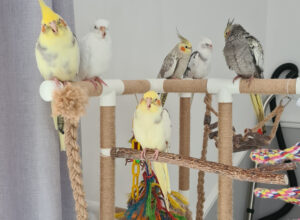tAMING AND BONDING WITH YOUR COCKATIEL
Key Takeaways
- Understanding Your Bird: Learn the basics of cockatiel behaviour to form a strong bond.
- Patience is Key: Taming takes time and patience, moving at a pace comfortable for your bird.
- Consistent Interaction: Regular, gentle handling builds trust and companionship.
- Environmental Enrichment: A well-set-up cage and play area promote happiness and health.
- Health and Nutrition: Proper diet and regular veterinary care are essential for a thriving cockatiel.
Cockatiels are among the most popular pet birds in the UK, known for their charming personalities and capacity for interaction. Taming and bonding with your cockatiel can be a rewarding experience, offering years of companionship.
As a cockatiel owner and enthusiast, I’ve experienced the joy these feathered friends bring into our lives. Their social nature and intelligence make them ideal companions, but like any relationship, the bond with your cockatiel must be nurtured.
Essential Cockatiel Care
Before diving into taming techniques, it’s crucial to ensure your cockatiel’s basic needs are met. A healthy, comfortable bird is more receptive to bonding efforts.
Setting Up Your Cockatiel’s Cage
A proper cage setup is the foundation of your bird’s wellbeing. Your cockatiel’s cage should be spacious, secure, and filled with enrichment opportunities. Ensure it’s equipped with suitable perches, toys, and feeding dishes. For detailed guidance on cage setup, visit Setting up a Cockatiel Cage.
Essential Cage Items
| Item | Purpose |
|---|---|
| Perches | For resting and foot health |
| Toys | For mental stimulation and play |
| Water and Food Dishes | For hydration and nutrition |
| Cuttlebone | For calcium intake and beak health |
Daily Cockatiel Care
Daily care routines are pivotal for maintaining your cockatiel’s health and happiness. This includes providing fresh water and a balanced diet, cleaning the cage, and ensuring they get adequate exercise and sunlight. For a comprehensive overview, see Daily Cockatiel Care.
Understanding Cockatiel Behaviour
Recognising and interpreting your cockatiel’s behaviour is essential for effective taming and bonding. Cockatiels communicate through body language and saounds, signaling their mood and needs. Familiarising yourself with these cues helps in creating a supportive environment for your pet. Learn more about their behaviour at Understanding Cockatiel Behaviour.
The Taming Process
Taming a cockatiel requires patience, consistency, and understanding. Start by spending time near their cage each day, speaking softly to get them accustomed to your presence. Gradually, you can introduce your hand into the cage with treats to encourage them to approach you.
Taming Stages
| Stage | Description |
|---|---|
| Acclimatisation | Getting your bird used to your presence and voice |
| Hand Feeding | Offering treats from your hand to build trust |
| Handling | Gently holding your cockatiel, increasing physical contact |
| Training | Teaching basic commands and tricks to strengthen your bond |
Bonding Activities
Engage in activities that both you and your cockatiel enjoy to deepen your bond. This can include:
- Training Sessions: Use positive reinforcement to teach your cockatiel simple commands and tricks. This not only stimulates their mind but also enhances mutual trust. See Training Cockatiel Basic Commands for tips.
- Playtime: Dedicate time each day to play with your cockatiel outside their cage. This can involve interactive toys, obstacle courses, or simply cuddling.
- Talking and Singing: Cockatiels are social creatures that enjoy vocal interactions. Talk and sing to your bird regularly to foster a communicative bond.
Health and Nutrition
A healthy cockatiel is more likely to engage positively with their owner. Ensure your bird receives a balanced diet, consisting of high-quality pellet food, fresh fruits, and vegetables, and has access to clean water at all times. Regular veterinary check-ups are crucial to monitor their health and address any issues promptly. For more on nutrition and health care, visit Cockatiel Feeding Basics and Cockatiel Veterinary Care.
Overcoming Challenges
Bonding with a cockatiel may present challenges, such as shyness, aggression, or fear. It’s important to move at a pace comfortable for your bird, avoiding forceful interactions. Understanding and patience are key—remember, trust takes time to build.
There are also hormones to consider. This is especially the case with males. As I found with Buddy when he hit 6 months old. My once-lovely cockatiel seemingly turned aggressive on me. But it was only temporary as he was approaching sexual maturity. It’s a sad fact that most cockatiel surrenders are males aged around 6-7 months. Their owners don’t understand how this stage affects their behaviour.
Conclusion
Taming and bonding with your cockatiel offers a unique opportunity to develop a deep, rewarding relationship with your feathered companion. By providing proper care, understanding their behaviour, and engaging in regular, positive interactions, you’ll establish a bond built on trust and affection. Remember, each cockatiel is an individual with their own personality and preferences—embrace these differences as you grow together.
My bond with my tiels is the best thing about owning them!
For further information on cockatiel care, explore the detailed guides available at Essential Cockatiel Care and immerse yourself in the rewarding journey of cockatiel ownership.

